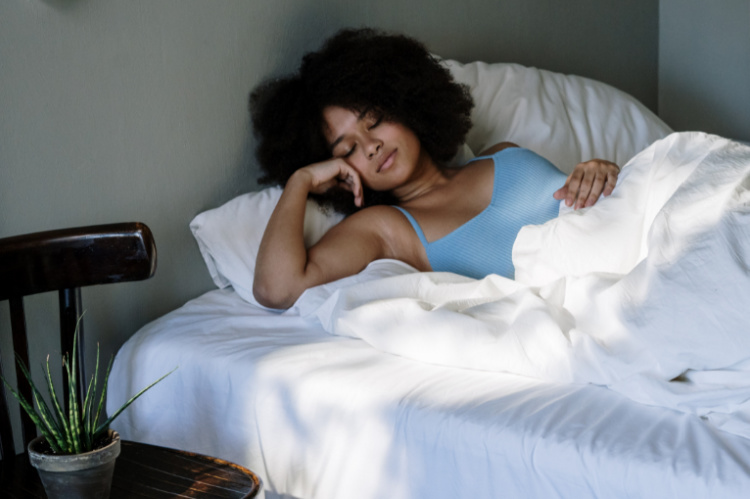Less Sleep Linked to Dementia Risk (Plus 9 Ways To Snooze Better)
Jun 14, 2021

One of the most important things you can do to ensure your wellness is covered across all bases is to get a good night’s sleep.
That’s true for all ages, and getting at least six hours a night is especially important for adults over age 50.
In fact, a recent study from researchers at Whitehall found that among 7,959 British men and women, those who got six hours of sleep or less a night, compared to seven, had a 30% increased chance of getting dementia. The researchers collected data on the men and women at ages 50, 60 and 70 over the course of 30 years.
Dr. Gabe Mirkin — a fitness guru, longtime radio host and sports medicine doctor with more than 50 years of practice — said in a recent blog post that those who are struggling getting quality sleep should check with their doctor on potential issues.
Those include, “significant sleepiness during the day, chronic snoring, frequent leg cramps or tingling, difficulty breathing during sleep, chronic insomnia, or any other major symptom that interferes with your sleep,” Mirkin said.
Mirkin also added that sleeping pills are probably not the way to go either.
“They can help you fall asleep at night, but they tend to lose their effect as you keep on taking them, and they have many serious side effects,” Mirkin said.
Rather than taking the sleeping pill, there ARE steps you can take to wind down your mind and body ahead of bedtime — and hopefully have a better night’s sleep as a result!
1) Experience light & dark.
Our bodies are heavily influenced by light and dark. Make sure you’re keeping your blinds and curtains open and your home well-lit throughout the day. Then, at night, make sure your bedroom is completely dark, with the curtains drawn and all electronics off.
2) Keep it cool.
Temperature is another thing that plays a big role in how you sleep. When it’s too hot, it can make it difficult to fall asleep.
Find a setting on your thermostat that works for you. You also may find that your mind and body can more easily wind down by taking a hot shower or bath about an hour before bed.
3) Let go of the stress.
Ok, that one’s a bit easier said than done in this day and age. Luckily, there are techniques you can use to get rid of the anxiety of the day. Meditation is a great tactic to calm you physically and mentally. If you aren’t sure how to meditate, check out our list of recommended apps.
Another technique is to practice mindfulness. Focus your mind on what you see, smell, feel, and hear, instead of the things you can’t change or control in that moment.
4) Turn that clock around.
On nights that are a little trickier to fall asleep, the last thing you need is to be starting at the minutes tick by, which will only cause you further frustration and stress that you’re not going to sleep. The simple act of turning the clock around so it’s not facing you will go a long way toward alleviating that problem and may help you doze off faster.
5) Skip the afternoon nap.
Naps may sound great in the moment, but napping during the day can actually make it a lot more difficult to fall asleep at night.
That’s because it disrupts the body’s natural sleep-cycles, making it tougher to fall asleep and disrupting sleep during the night.
6) Get into a routine.
Our bodies respond to patterns. Try to wake up and go to bed at the same time each day to get your body into a habit.
Eventually, that habit will become the norm, making it easier for your body to fall asleep faster, and even making the mornings more enjoyable.
7) Unwind 45 minutes before bed.
Part of that routine should also be to unwind ahead of bedtime. That means putting away the phone or computer and turning off the TV so that the blue light, which may affect melatonin levels, is gone. (Melatonin is a hormone that affects the sleep cycle). Instead, grab a book and read, journal, or practice meditation and deep-breathing. This can work wonders toward getting your mind into its most restful state so it’s ready to fall asleep the minute your head hits the pillow.
8) Limit caffeinated beverages.
Drinking things like coffee, soda or energy drinks throughout the day, and especially before bedtime, can be detrimental to falling asleep. Substitute those drinks with healthier options like tea or water.
That goes for alcohol, too. While drinking alcohol may seem like it helps you fall asleep, it has been shown to disrupt sleep through the night, and too much of it could impact your health in the long run.
9) Get comfortable.
Make sure you have a quality mattress, are dressed in something comfortable and have quality bedding.
You can also try adjusting your sleep position. If you’re used to sleeping on your back or stomach, try training yourself to sleep on your side, which has been linked to the highest-quality sleep.
Trying just a few of these tips may drastically improve your sleep quality, ensuring you keep your body and mind healthy and that you’re at your best.
Do you have a special trick you use to fall asleep faster? Share it in the comments below!
------------------------------------------------------------------------------------
Author: Caitlin H
Diet-to-Go Community Manager
Caitlin is the Diet-to-Go community manager and an avid runner. She is passionate about engaging with others online and maintaining a healthy, active lifestyle. She believes moderation is key, and people will have the most weight loss success if they engage in common-sense healthy eating and fitness.










